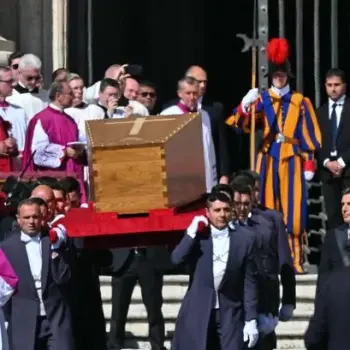Ever hear a good old-fashioned hellfire-and-brimstone if-you-don't-change-your-ways-you're-going-to-the-Bad-Place sermon?
Yeah, me too. More than a few.
At the time, I just felt like I was being pummeled about the head and shoulders with a crucifix. Maybe you did too.
But what you and I didn't know when we were sitting in the pew—because we didn't have pastor and preaching scholar Frank Thomas' new book American Dream 2.0 to help us—was that we were witnessing one of the most durable and effective types of rhetoric our faith and our nation have ever known: the jeremiad sermon.
The jeremiad is named after the prophet Jeremiah, who had a tendency to call his people to account and remind them that if they didn't clean up their acts, they were headed for disaster. It can be employed for everything from the parental or pastoral admonition to the civic warning of communal disaster. We are familiar with the latter from both political parties when we dare to pursue the policies of their opponents. It is, as the Rev. Dr. Thomas points out, an essentially "public ritual designed to join social criticism to spiritual renewal, intertwining practical spiritual guidance with advice on public affairs."
The American jeremiad, in particular, is also an optimistic form of rhetoric. However bad things may be at the moment, America is a great nation, and we have the ability to turn things around if we'll just pay attention to what we're doing and make moral (or good political) choices.
It is also an essentially conservative rhetoric that often looks to the past for our best days, and suggests if we'll return to the way things were once done (or we imagine they were done), then everything will be okay.
The problem, as the Rev. Dr. Thomas points out, is that not all Americans have the same experience of America, or the same remembrance of the past. As American Dream 2.0's title suggests, not all of us have realized or are now realizing the so-called American Dream of success and justice. In fact, events of recent years, particularly the Great Recession, have made it clear that some people in America are far more equal than others, some have great political power while others have none, some people are suffering while others grow ever richer.
That's why in the Rev. Dr. Thomas' black preaching tradition, criticism of the American system is often more pointed, and African-American jeremiads are—not surprisingly—less optimistic about the possibility of justice. It's this failure to preach in the accepted American jeremiad style that causes some to believe that preachers like the Rev. Jeremiah Wright, President Obama's former pastor, are un-American. How could anyone curse America, the greatest nation in history, from the pulpit?
What the Rev. Dr. Thomas teaches us, though, is that the traditional American jeremiad is not capable in and of itself of encompassing the American experience of minorities, the poor, and the forgotten. Rev. Wright told the National Press Club at his controversial appearance there in 2008 that media attacks on his rhetoric were not about his preaching in particular, but about black preaching in general, which plays by different rules than white preaching. Most importantly, perhaps, it refuses to pretend that America is capable of justice for all without deep, systemic change:
God's desire is for positive, meaningful, and permanent change. God does not want one people seeing themselves as superior to other people. God does not want the powerless masses—the poor, the widows, the marginalized and those underserved by the powerful few—to stay locked into sick systems which treat some in the society as being more equal than others in the same society. God's desire is for positive change, transformation; real change, not cosmetic change, transformation; radical change or a change that makes a permanent difference, transformation. God's desire is for transformation, changed lives, changed minds, changed laws, changed social orders and changed hearts in a changed world. This principle of transformation is at the heart of the prophetic theology of the black church.
If you're a believer in American exceptionalism—that is, you believe America is the greatest, most powerful, and most democratic nation on earth, or that it doesn't require more than a return to some previous way of thinking or acting to retrieve its God-given destiny—then the idea that America should undergo radical and fundamental change will scare the hell out of you. One of the challenges I took on in Faithful Citizenship is how difficult it is to have a conversation about how or even whether America should change when mindless patriotism seems to be the law of the land.





